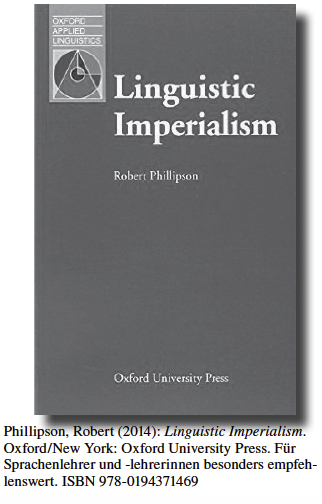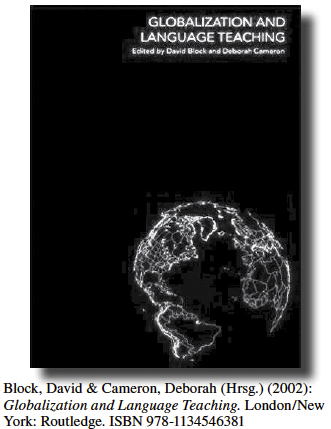Language- and educational policies as imperialistic power policy
Language- and educational policies as imperialistic power policy
hofm. It is a matter of language policy which languages are officially spoken in a country. In Switzerland, the national constitution and in detail the language law regulates the language policy. It states that Switzerland’s four national languages must be treated equally, regardless of the size, the economic and political power of the linguistic regions. The equal treatment of the official languages expresses an even more fundamental value, namely the respect for freedom and dignity of the people who live within their languages and have a native culture therein. It is also a matter of language policy which languages schools teach in addition to the mother tongue and since it concerns the educational system, a matter of educational policy, too. This became apparent in the debate about the implementation of “Frühenglisch” (early English teaching form the third grade on). It showed how closely language correlates with education policies. Both fall into the regulatory competence of the sovereign constitutional state and – as in the case of direct democratic, federalist Switzerland – into the regulatory competence of the cantons. Therefore it is up to the citizens in the cantons to decide concretely on language and educational policy issues; based on distinct federalism Switzerland had been successful to preserve the diversity of languages and cultures and, a fact that should not be taken for granted, to ensure the internal cohesion and the language peace.

However, many people are unaware of the fact that there are states, which in international relations try from the exterior to force their language, their values and their culture on other countries by means of power, money, and aggressive marketing. The aim is to disparage and weaken the other’s cultural and language identity, so that – in the service of imperialistic power – the own one appears superior. The linguist Robert Phillipson, who researches and teaches in Denmark, reveals all this in his book “Linguistic Imperialism” which has been reissued in the past year. While reading, things regarding the current competency reforms in language-teaching (and beyond) become much clearer; they are in fact no national inventions, but imported into the countries from outside.
Phillipson shows, how this works and for what purpose based on the Anglo-Saxon countries’ colonial or post-colonial language policy. He quotes confidential British government reports, revealing that the British interests had to be secured by investing in the academic infrastructure of the former colonies and by spreading the English language. This meant to establish English as the language of academic “elites” and as “superior” language. According to Phillipson, during the period of 1950-1970 government-related and private foundations in the US had expended large amounts of money, maybe the biggest amounts ever spent in history, on the spreading of a language. The spreading of English had thus been used as a means of foreign policy in order to gain power.

The ones, who are able to enforce their language in international relations, have advantages in regional or global competition for both economic influence and economic power; therein he broaches the extremely problematic amalgamation of “foreign language policy, cultural policy and educational policy” on the one hand with foreign policy on the other.
After the communist regimes had collapsed in Eastern Europe in the early 1990s, the Anglo-Saxon countries took the opportunity to spread English in a region, which was not really under their influence until then. At the time, the British Foreign Minister Douglas Hurd proclaimed to do everything possible to make English the leading foreign language in Eastern Europe. The yearbook of the British Council in 1991/92 reads: One had reacted fast and unconventionally in order to spread what England stands for, namely liberal democracy, free market and especially the English language.
This way the English language was equipped with associations such as “freedom”, “democracy” and “western market liberalism”, and this language image was spread by language teaching. And with the English lessons also teaching methods arose that were connected to attributes such as “modern”, “self-directed”, “democratic” and that were mostly put in contrast to the supposedly “externally controlled”, so-called “chalk and talk”-teaching.
In another in this context recommendable book, “Globalization and Language Teaching”, the Sri Lankan linguist Suresh Canagarajah, who is teaching in the US, has his say. He knows the facts from his own experience. Teaching methods, he writes, are not value-free tools that are developed and tested solely by empirical research for practical use, but rather cultural and ideological constructs with political and economic consequences. Teaching methods influence the activities in the classroom, the social relationships, the way of thinking, the strategies of learning and so on, namely in accordance with those who implement them in the schools of other countries and cultures, to cause a “cultural change”. According to Canagarajah, the dissemination of teaching methods can be considered as an “attack” on culturally different ways of thinking, learning and social interaction; and it can be seen as an attempt to spread uniform values and practices.
In Canagarajah’s view it is evident that this influence comes from the economically strong, powerful industrial nations such as the USA, England, France, Germany and so on, who use their economic and technological superiority to force their way of thinking and their values upon less developed countries, emerging or Third-World-countries by language teaching. Many teachers in these countries believe that the teaching methods that are spread in scientific glossy journals, in teacher-training programmes and by professional looking organisations therefore are more modern, more effective, and more democratic.
Much of the competence-oriented education reform that comes from the Organisation for Economic Cooperation and Development (OECD) or the EU can be better evaluated in its nature and importance after having read the two books. •